How Ahmaud Arbery’s Accused Murderers Could Still Get Off
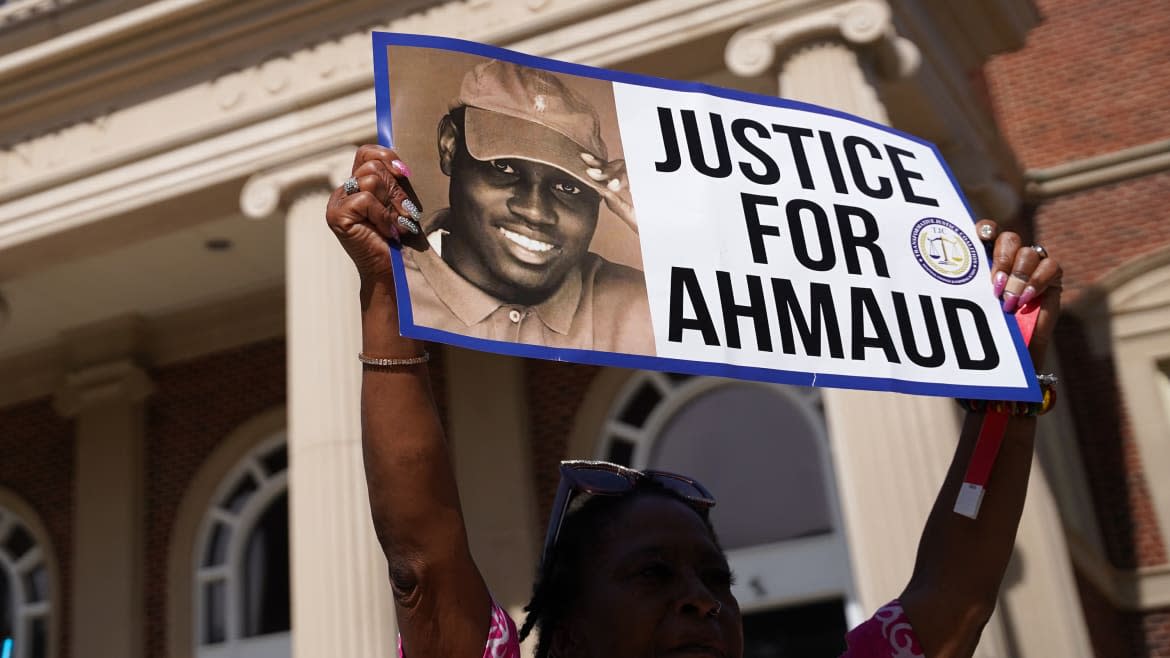
- Oops!Something went wrong.Please try again later.
Last May, as the United States grappled with a cascading and increasingly deadly pandemic, a stomach-churning video of three men chasing and shooting down a Black man on a Georgia street went viral.
The incident, which had occurred 70 days prior and was caught on camera by one of Ahmaud Arbery’s alleged murderers, prompted protests for racial justice. Anger only grew louder with the knowledge that nobody had been arrested in the 25-year-old’s slaying despite damning video evidence and 911 calls pointing to the trio of alleged perpetrators.
But the delay in justice in Arbery’s death somehow kept getting more brazen. Two district attorneys rescued themselves from the case—one has even been charged criminally for their response to the episode—even as they and other law-enforcement officials faced credible accusations of corruption in an area marred by a long legacy of police and official misconduct. Meanwhile, several controversial Civil War-era statues appeared to, at least in part, open the door for legal justification of the gruesome killing many have described as a “lynching.”
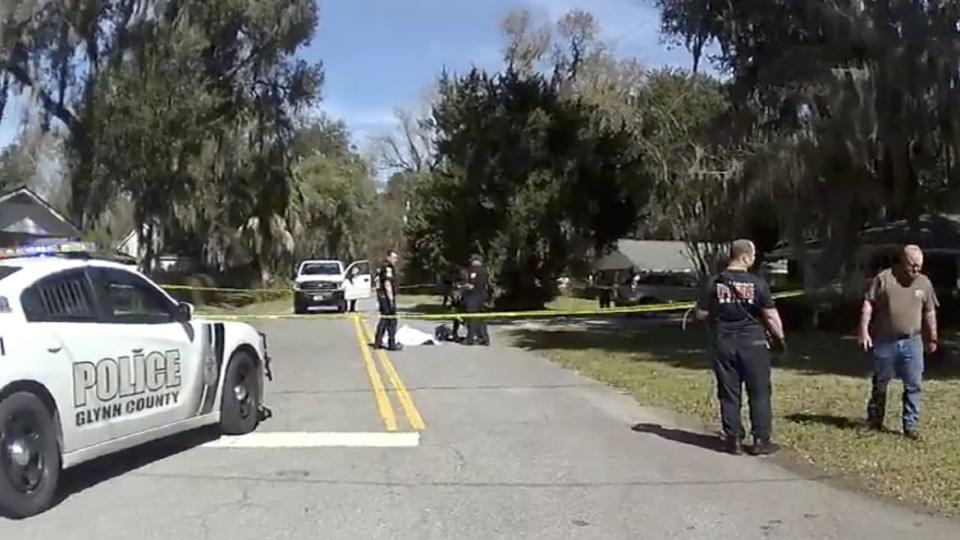
Police body camera video shows the covered body of Ahmaud Arbery, a 25-year-old Black man, who was shot and killed while running in a neighborhood outside of Brunswick, GA.
Now, a trial for the three men—Gregory McMichael, his son Travis, and their neighbor William Bryan—charged with Arbery’s murder has finally begun in Glynn County. But the early stages of the process are serving mostly to fuel fears that the viral video that helped reinvigorate the Black Lives Matter movement even before the murder of George Floyd may not be enough to secure a conviction.
“From a legal standpoint, this trial is not as open and shut as some people might believe,” J. Tom Morgan, a former DeKalb County district attorney, told The Daily Beast. “I can see why every district attorney in this area did not want to touch this.”
Experts consulted by The Daily Beast pointed to a messy jury selection process as the latest looming obstacle for the already-complicated case. Since Oct. 18, prosecutors and defense lawyers have questioned over 100 Glynn County residents to be part of this trial, where the trio of defendants are facing a slew of charges, including malice and felony murder. They have pleaded not guilty.

Travis McMichael and Gregory McMichael attend the jury selection in their trial on October 27, 2021 in Brunswick, Georgia for the killing Ahmaud Arbery in 2020.
So far, numerous jurors have admitted to Judge Timothy Walmsley they already have strong opinions of the case, personally know the defendants, or are terrified about the possibility of rendering a verdict that might have social and legal consequences on the community.
“I think it would be naive to think there couldn’t be real-world repercussions,” one female resident reportedly said this past week.
The sluggish pace has made it difficult for the court to even come up with the 64 residents needed to complete the initial round of jury selection. Afterward, prosecutors and the defense will need to go through the process of questioning each one to confirm the 12 jurors and 4 alternates needed for the trial. As of Friday afternoon, 53 potential jurors qualified to advance to the next round—pushing back the initial deadline for the first phase of the jury selection process into at least another week.
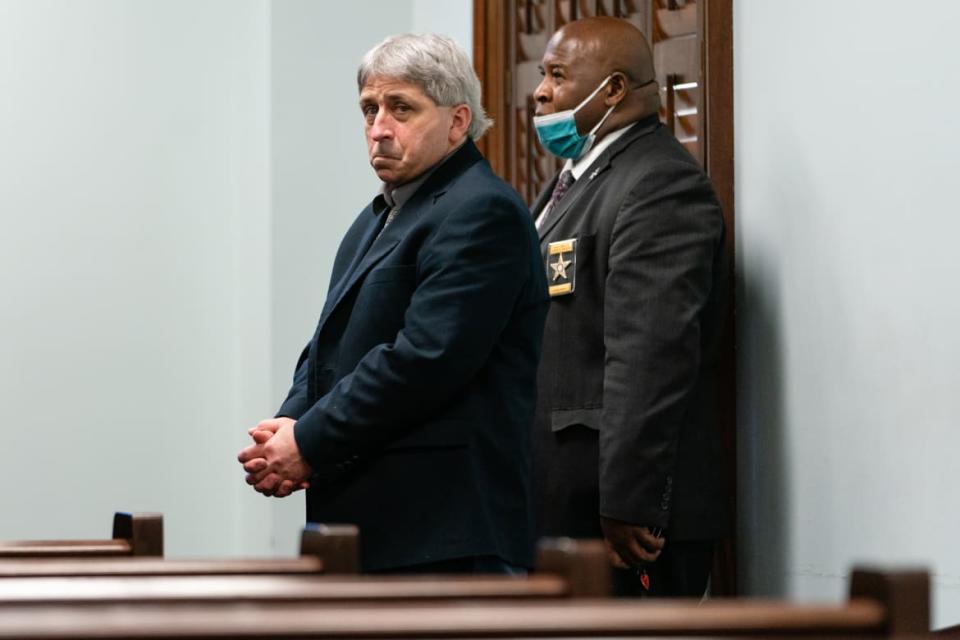
William "Roddie" Bryan attends jury selection in the trial of the men charged with killing Ahmaud Arbery at the Glynn County Superior Court on October 26, 2021.
Morgan noted that if the slow pace of just the first round of jury selection continues, Walmsley might be forced to conclude that the McMichaels and Bryan can’t get a fair trial in Glynn County. That, in turn, could further delay one of the most closely-watched trials since the April conviction of George Floyd’s murderer, former Minneapolis police officer Derek Chauvin.
“All eyes are on this case and they are on this case for many reasons,” Ronald Carlson, a professor in the University of Georgia School of Law, told The Daily Beast. “This case has had many problems from the start, and further delay in the case would only be met with outcry.”
Those who knew Arbery tend to describe the 25-year-old former high-school football star as the kind of person who “would give you the shirt off his back if you needed it.”
“Ahmaud was a great person. Someone that put others before himself,” Akeen Backer, one of his childhood friends, told The Daily Beast. “A giving person. Caring person. A loving person.”
After briefly enrolling at South Georgia Technical College, Arbery lived with his mother about a mile and a half away from Satilla Shores—an upscale neighborhood in Brunswick, Georgia. To clear his mind during this time of transition, Arbery went on long jogs almost daily, usually taking a route that passed the predominantly white neighborhood.
However, some Satilla Shores residents were on high alert after a series of break-ins in the subdivision had been reported. Among them was Gregory McMichael, a 64-year-old former police officer and retired investigator with the Brunswick District Attorney’s Office.
According to a police report, the elder McMichael happened to be in his front yard shortly after 1 p.m. on Feb. 23 when he saw Arbery “hauling ass” after leaving a home under construction. The construction site owner, Larry English, has previously said it looked like Arbery was looking for water and had not taken anything from the home, according to motion-sensor cameras.
But Gregory McMichael insisted to police after the incident that he believed Arbery was the man who had been involved in several of the recent break-ins and ran inside the house to tell his son—and grab his .357 Magnum.
“Travis, the guy is running down the street, let’s go,” Gregory said, according to the report, which also notes that Travis grabbed his shotgun because, the duo claimed, they “didn’t know if the male was armed or not.”
The father and son then got into their pickup truck and drove down Satilla Drive to chase after Arbery, where they unsuccessfully cut him off. Their neighbor, William “Roddy” Bryan, then joined the pursuit in his own truck and began to record the infamous video of the encounter.
Authorities say Bryan also unsuccessfully tried to “pin” Arbery, prompting Gregory McMichael to jump into the bed of the truck while his son drove and aimed a shotgun out of the driver’s side door.
During the chase, Gregory McMichael told police, he yelled at Arbery to “Stop, stop, we want to talk to you” before pulling up beside him. “Travis [McMichael] exited the truck with the shotgun”, the father said, and Arbery “began to violently attack Travis and the two men then started fighting over the shotgun, at which point Travis fired a shot and then a second later there was a second shot.”
Former DA Indicted for ‘Showing Favor’ to Suspect in Ahmaud Arbery Case
Bryan’s now-infamous footage showed Arbery was shot in the chest. The footage also showed that while Travis McMichael and Arbery were in a scuffle, Arbery was shot another two times.
As Arbery laid on the ground with several gunshot wounds, Travis McMichael called Arbery a “fucking n-----,” the Georgia Bureau of Investigation (GBI) later said during a preliminary hearing.
Attorneys for Travis McMichael and Bryan did not respond to a request for comment, but the former’s lawyers have previously said in a statement that their client “has been vilified before his voice could even be heard.” Frank Hogue, who is representing Gregory McMichael, told The Daily Beast that while jury selection “is labor-intensive in a case like this,” his team has confidence a “fair and imperial jury” will be seated in Glynn County.
Hogue added that he does not expect the alleged slur to be brought up at trial “because this is not a ‘hate crime’ and the State’s theory is not that Travis killed Ahmaud Arbery out of racially motivated hate but, instead, that he did not have sufficient grounds to have believed that Arbery was fleeing in an attempt to escape capture from a felony he may have committed in the neighborhood.”
“While nobody knows, of course, what verdict a jury will reach, if any, we think that a fair and impartial jury should acquit the McMichaels. We think Greg’s chances are good,” Hogue added.
Several minutes after the shooting, Glynn County police officers arrived at the scene. Arbery was still alive and seen trying to breathe in released bodycam footage. But the officers did not provide assistance to Arbery as he lay on the ground for several minutes and instead spoke to the elder McMichael.
“He had no choice,” Gregory McMichael is heard telling an officer multiple times in the footage about Travis, seemingly setting up the defense that his son was evoking his right under the state’s so-called Stand Your Ground law, which allows Georgians to use deadly force if they believe they are risk of bodily injury or death.
Carlson, the professor at the University of Georgia law school, believes that the McMichaels immediately insisting that Arbery was the perpetrator of the recent break-ins gave them grounds to invoke the state’s citizen’s arrest law. Like the so-called Stand Your Ground provision, the Citizen’s Arrest statute—which was largely neutered by lawmakers amid uproar over the shooting—may be the crux of the defense’s case for the McMichaels and Bryan.
“The citizen’s arrest law is an inherently racist statute that was created around the Civil War,” Carlson said. “And while it was basically repealed last year, it was alive and well during Arbery’s murder. And knowing Gregory McMichael’s law enforcement past, I’m sure he knew about it and Stand Your Ground.”
Morgan, a former metro Atlanta district attorney who is now a criminal defense lawyer, added: “[Gregory McMichael] worked in the DA’s office, he knew the law. He knew what to do and say.”
Court documents suggest that elder McMichael leaned on his law-enforcement ties immediately after the incident. Prosecutors state that one of Gregory Michael’s first calls was to Brunswick District Attorney Jackie Johnson, where he left a voicemail seeking advice.
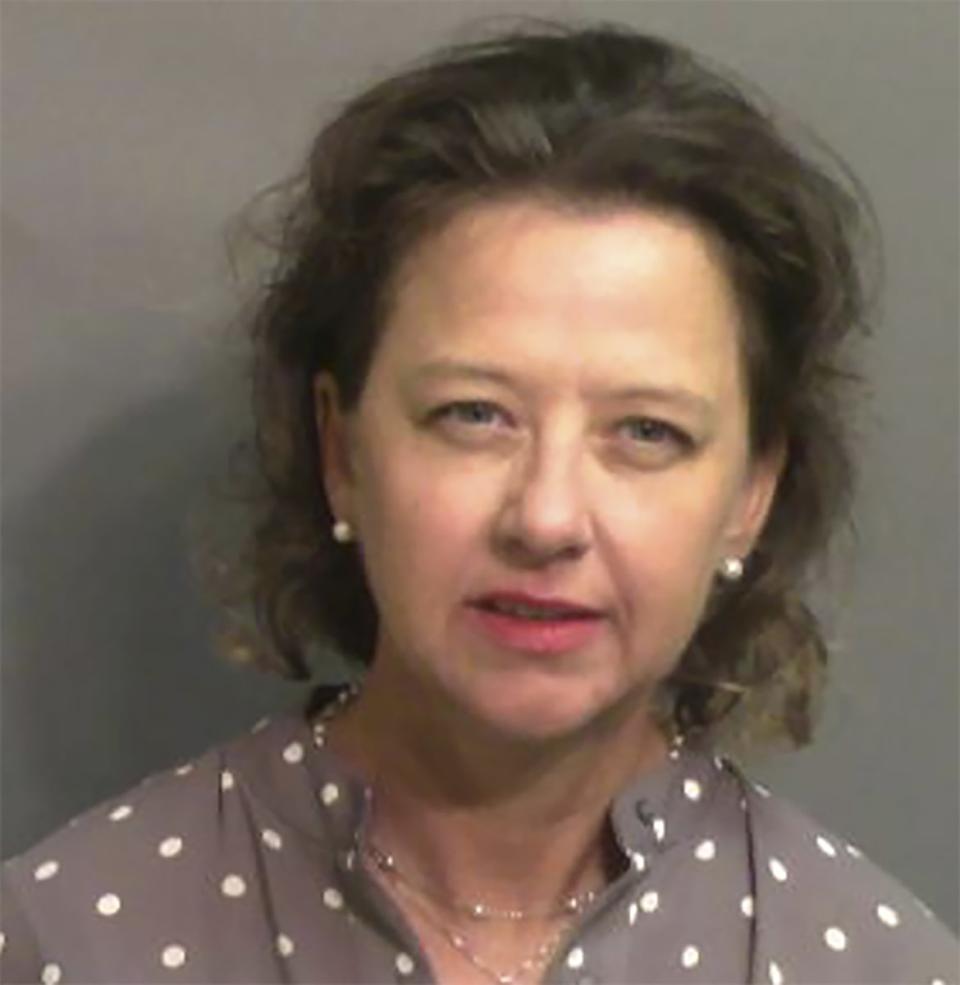
Jackie Johnson, the former district attorney for Georgia’s Brunswick Judicial Circuit, after she turned herself in to the Glynn County jail in Brunswick, Ga, on Sept. 8, 2021. A grand jury indicted Johnson on charges of violating her oath of office and obstructing police in her handling of the February 2020 killing of Ahmaud Arbery.
While it is not immediately clear whether Johnson called him back, the former DA recused herself from the investigation on Feb. 27, when she revealed that Gregory had been a longtime investigator for her office. At the time, Johnson referred the case to Waycross District Attorney George E. Barnhill—a move that Morgan said was the first “major misstep in the investigation.”
Hogue denied that Gregory McMichael called Johnson seeking special treatment in order to avoid arrest or charges.
“[Johnson] was running for re-election, Greg knew that the incident would become major local news, that it would be a part of the story that he once worked for DA Jackie Johnson, so he wanted to give her a courtesy call to be prepared for inquiry from the media about him as soon as the story broke,” Hogue said, adding that his client “assumed that she would immediately recuse herself.”
Ahmaud Arbery’s Killers Are Trying to Put Him on Trial. Will a Judge Let Them?
Morgan believes Johnson should have immediately recommended the case to a special prosecutor, and not Barnhill.
“This is a small DA’s office. It’s not a big urban area. The second that she knew this case involved someone [Gregory McMichael] that was a former investigator for her office, she should have put up a Chinese wall and recused herself. But she intervened and did not follow protocol,” Morgan, who admitted that he was not “a big fan of Jackie Johnson,” said. “Then, when she finally did recuse herself, she didn’t even send it to an independent person. These are big mistakes here.”
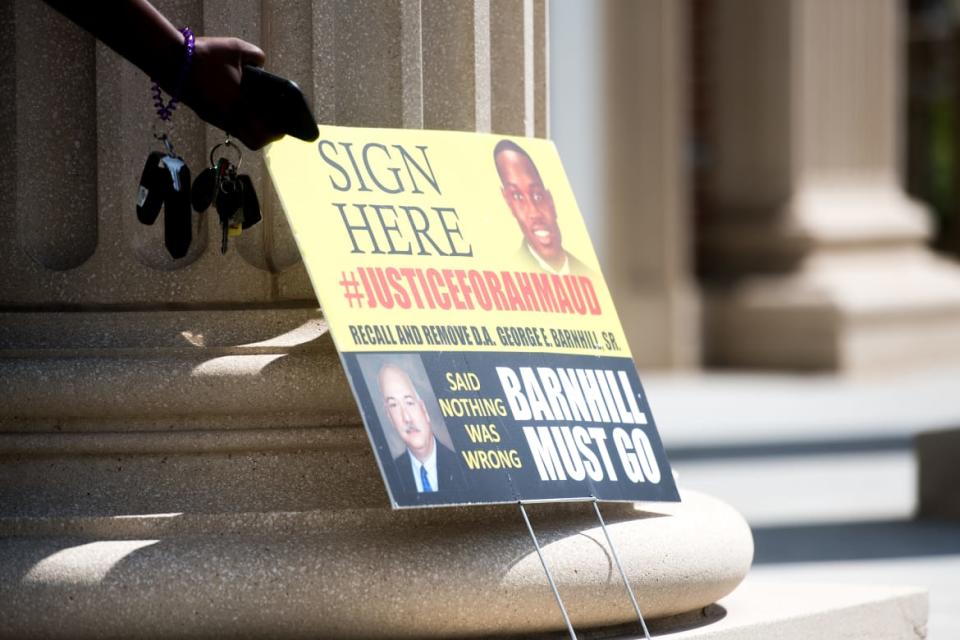
A sign calling for justice for Ahmaud Arbery and the recall of DA George Barnhill Sr. sits outside the Glynn County Courthouse on July 17, 2020.
“We’re talking about South Georgia, where everyone knows everyone else. If she had followed the protocol from the start, we wouldn’t be having this conversation,” Morgan added.
On Sept. 2, Johnson, having already lost a re-election bid, was indicted on several charges—including obstructing police—after allegedly helping to shield the McMichaels from the Arbery investigation. This allegedly included directing officers to not arrest the pair after the incident. The indictment states that Johnson showed “favor and affection” to Gregory McMichael and failed to treat Arbery’s family “fairly and with dignity” when she recused herself from the investigation. Johnson has not yet entered a plea in her case, and her attorneys could not be reached for comment.
But while Johnson was charged months after she had passed off Arbery’s case to Barnhill, Morgan argues that the latter made his own mistakes in the case.
In early April 2020, Barnhill recused himself as well, noting in a letter that his son worked in Johnson’s office, and had even worked with Gregory McMichael on a prosecution involving Arbery.
But before completely relinquishing control of the case, Barnhill wrote a letter to the Glynn County Police Department arguing that there was “insufficient probable cause to issue arrest warrants” for Bryan and the McMichaels.
The letter detailed the DA’s reasoning against prosecution, stating that it appeared the trio’s intent “was to stop and hold” a burglary suspect until law enforcement arrived, and their citizen’s arrest actions were “perfectly legal” under Georgia law. Barnhill added that Travis McMichael and his father were within their rights to carry their firearms that day under Georgia’s open-carry law—and that the shuffle between the younger McMichael and Arbery gave him grounds “to use deadly force to protect himself” under state law.
Morgan believes Barhill’s decision to provide his opinion about the case he was recusing himself from “was a violation of the Georgia Code of Ethics.” Barnhill did not respond to The Daily Beast’s request for comment. The Georgia Bar has not reported any public discipline against Barnhill.
“If you recuse yourself from the case, you keep your mouth shut,” Morgan said. “He made a public statement in a case that he has been involved—and provided a blueprint for a defense. Once he recused himself, his opinion is no different from my opinion from my classroom in North Carolina.”
The GBI also announced in the spring of 2020 that the agency was investigating whether Barnhill mishandled Arbery’s case.
By April 13, 2020, the case had been transferred to its third prosecutor, Atlantic Circuit District Attorney Tom Durden. Less than two weeks later, the graphic video of Arbery’s killing was released to the public by a criminal-defense lawyer who had briefly consulted for the McMichael family—prompting the Georgia Bureau of Investigation to take over the case at Durden’s request.
At the time, the lawyer later told The New York Times, they released the video to dispel rumors about the incident. Instead, it spurred a national outcry over what critics called one of the most blatant acts of racial injustice captured on camera. The McMichaels were arrested just two days later, and Bryan two weeks after that.
At the end of May 2020, the state’s attorney general appointed Joyette Holmes of the Cobb County Judicial Circuit, making her the fourth prosecutor to oversee the case.
By March 2021, Georgia had gutted the citizen’s arrest law, with some lawmakers citing Arbery’s death as the inspiration. A month later, the McMichaels and Bryan were indicted on federal hate-crime charges—an important step, since the state did not have a similar statute of their own.
“The footage of Arbery’s death is right up there with the Rodney King video and the George Floyd video. It has aroused the same national reaction,” Carlson said. “And the video is an important component in the prosecution’s case. There was no video in the Trayvon Martin incident, where Stand Your Ground was also used, and the surviving member of that particular incident was able to set forth an account of it that was favorable to his case.”
If awareness of the video has already caused snags in jury selection, Carlson and Morgan agree that prosecutors have a long road ahead to win a conviction in this case.
“The defense will want to expose to the jury that under Georgia law, as it existed at that time, the McMichaels and Bryan were citizens that were entitled to give chase and detain a suspected person when they were in hot pursuit,” Carlson said, suggesting they will simply say: “They had probable cause, they believed Arbery had committed a burglary.”
Morgan added that prosecutors need to prove the shooting “was motivated by race and not by justice” to show Arbery’s killers were not following the letter or spirit of the law. The McMichaels’ legal team has insisted that the incident was not racially motivated—despite evidence released from the GBI that attributed previous racist social-media activity to Travis McMichael.
“The video is the key to this, it clearly shows Ahmaud was literally lynched in 2020,” civil rights attorney Benjamin Crump, one of the Arbery family lawyers, told The Daily Beast. “Even though the defense is going to try to do everything to attack his character, to try to justify the unjustifiable, there is no way around hiding that video to the jury. There is no way the jury will not see a young Black man running for his life before being fatally shot.”
Despite the various obstacles, Crump added, Arbery’s family remains optimistic about the trial.
For Baker, Arbery’s childhood who said he will be at the proceedings, the opportunity remains to see that justice be served “to all of these monsters.”
“Racism won’t be tolerated and [we] are going to fight back at all costs,” Baker added.
Get our top stories in your inbox every day. Sign up now!
Daily Beast Membership: Beast Inside goes deeper on the stories that matter to you. Learn more.

